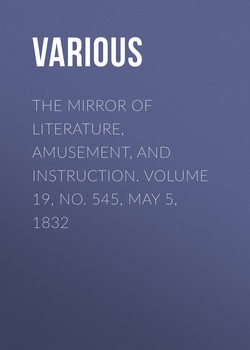Читать книгу The Mirror of Literature, Amusement, and Instruction. Volume 19, No. 545, May 5, 1832 - Various - Страница 5
ZOOLOGICAL GARDENS, REGENTS'S PARK
PECUNIARY COMPENSATION FOR PERSONAL INJURIES
Оглавление(For the Mirror.)
The present laws which enable a person to obtain pecuniary compensation for personal injuries, appear to be founded on very ancient precedent. Mr. Sharon Turner, in his History of the Anglo-Saxons, gives a statement of the sums at which our ancestors valued the various parts of their earthly tenements. He says "Homer is celebrated for discriminating the wounds of his heroes with anatomical precision. The Saxon legislators were not less anxious to distinguish between the different wounds to which the body is liable, and which from their laws, we infer that they frequently suffered. In their most ancient laws these were the punishments:
"The loss of an eye or of a leg, appears to have been considered as the most aggravated injury that could arise from an assault, and was therefore punished by the highest fine, or fifty shillings.
"To be made lame, was the next most considerable offence, and the compensation for it was thirty shillings.
"For a wound which caused deafness, twenty-five shillings.
"To lame the shoulder, divide the chine bone, cut off the thumb, pierce the diaphragm, or to tear off the hair and fracture the skull, was each punished by a fine of twenty shillings.
"For cutting off the little finger, eleven shillings.
"For cutting off the great toe, or for tearing off the hair entirely, ten shillings.
"For piercing the nose, nine shillings.
"For cutting off the fore finger, eight shillings.
"For cutting off the gold-finger, for every wound in the thigh, for wounding the ear, for piercing both cheeks, for cutting either nostril, for each of the front teeth, for breaking the jaw bone, for breaking an arm, six shillings.
"For seizing the hair so as to hurt the bone, for the loss of either of the eye teeth, or the middle finger, four shillings.
"For pulling the hair so that the bone become visible, for piercing the ear or one cheek, for cutting off the thumb nail, for the first double tooth, for wounding the nose with the fist, for wounding the elbow, for breaking a rib, or for wounding the vertebrae, three shillings.
"For every nail (probably of the fingers) and for every tooth beyond the first double tooth, one shilling.
"For seizing the hair, fifty scoettas.
"For the nail of the great toe, thirty scoettas.
"For every other nail, ten scoettas."
W.A.R.
